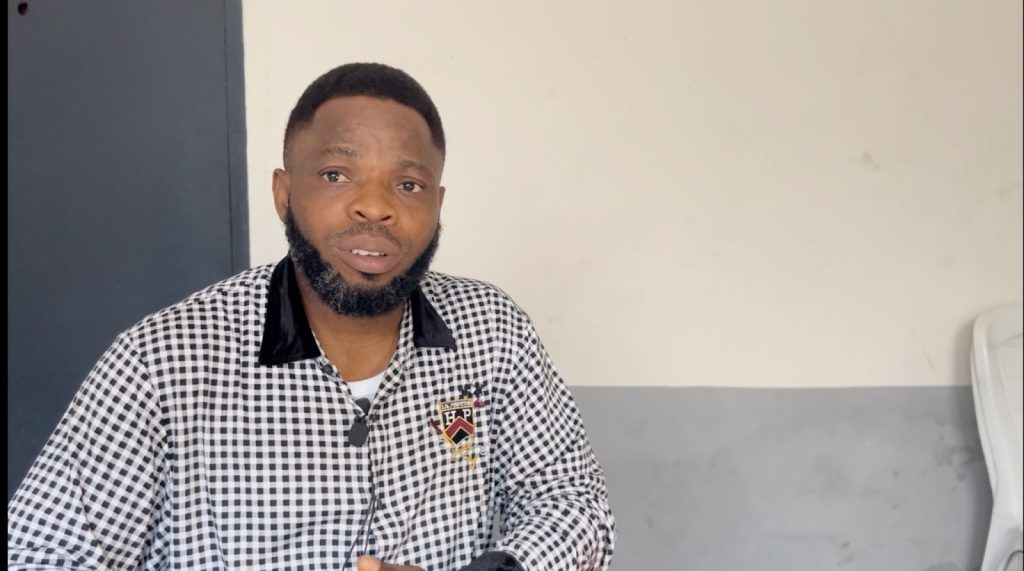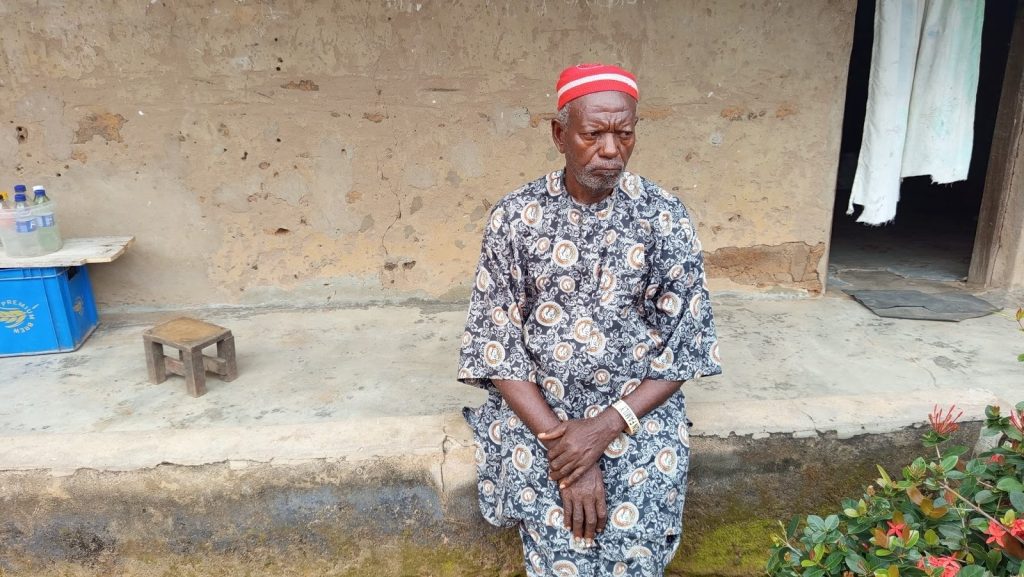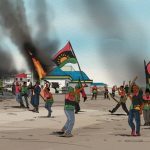A Text Message Is the Bridge Between Peace and Violence in Cross River
On a Sunday evening in March this year, Akiba Ekpeyong, a community leader in Akpap-Okoyong, received a text message that made him drop everything he was doing in the community, a cluster of farming villages in Odukpani Local Government Area of Cross River State, South-South Nigeria.
The message came from another chief nearby, warning of a brewing argument between two youths at a football match in Mbabam. The tone was urgent and frighteningly reminiscent of how many communal crises begin.
“I went there immediately,” Akiba recalled. “Before it turns to something else, we have to talk to the boys.”
That message was part of a growing network of peace responders linked through an early warning system created by the Foundation for Partnership Initiatives in the Niger Delta (PIND). In this system, the first step to preventing violence could be as simple as sending an SMS. In many communities across the region, this system has been deployed by the non-profit to end conflicts before they escalate.
The many faces of conflict
Cross River, fondly known as “the people’s paradise”, may be best known for its colourful annual Calabar Carnival and its vast forest reserves. However, unending land disputes, cult clashes, political rivalries, and resource competition that often turn deadly, are also a constant in the state, said Professor Rapheal Offiong, a geographer and peace scholar at the University of Calabar.
Between 2020 and 2023, communal and boundary disputes claimed more than 400 lives in the state, including that of a 10-year-old child, while over 300 houses were destroyed. A report also indicated that at least 15 of the state’s 18 local government areas have experienced one form of conflict or another during the period.
According to Professor Raphael, these crises stem from far deeper issues: Poverty, the quest for land, stress for survival, and lack of understanding, all worsened by a disconnect between the political class, traditional rulers, and the youth. “That gap in leadership and trust is what I see as the major disturbance,” he said.
The peace scholar also blamed greed and speculative land buying in poor communities. “It’s the landmongers,” he said, “those deep pockets who want to expand their cocoa or oil palm farms. They bring money, and because of poverty, people sell. Then everyone becomes territorial, and in trying to protect their territory, they must fight.”
Cocoa and oil palm are central to Cross River’s economy, providing livelihoods for thousands of smallholder farmers and driving both local and export revenue. The state is Nigeria’s second-largest cocoa producer, exporting about 80,000 metric tons annually. With so much economic value tied to these crops, land has become a fiercely contested resource — and when speculators or large investors seek expansion, tensions often erupt among communities struggling for ownership and survival.
Climate change, Professor Raphael added, is compounding the problem. As farmlands yield less, people move in search of better land to farm and to graze, opening new fronts for conflict. “The land is shrinking as population grows, and poverty and lack of basic social structures make it worse.”
He believes the persistent conflict is also tied to weak governance and the failure of social systems to provide stability. “When the system works, people have hope,” he said. “Everybody struggles to survive. The quest to provide for yourself and your family is not easy, and that desperation drives conflict.”
The Institute for Peace and Conflict Resolution (IPCR) similarly notes that environmental and land-use issues are increasingly among the most common triggers of rural conflicts in southern Nigeria, particularly boundary disputes.
From just a text message
The early warning system was developed by PIND in 2015 to monitor the country’s signs of violence during the general election, before it was later deployed to communal conflicts.
Through the platform, anyone can report incidents by sending a text message to 080 9936 2222 or 0912 233 4455, including details such as the location, date, and a brief description of the event. Once submitted, the report appears instantly on a web-based dashboard at PIND’s headquarters, where analysts verify and map signals across the Niger Delta. These reports help identify emerging hotspots, track patterns of unrest, and guide long-term peace interventions.
These reports are shared with Partners for Peace (P4P), a PIND-run conflict management and peacebuilding network of grassroots volunteers spread across all nine Niger Delta states. Each report helps P4P chapters plan their local peace activities, which include mediation, dialogues, and sensitisation.
“We now prepare our interventions based on the prevailing types of conflict in a given year,” Ukorebi Esien, P4P’s Cross River State Coordinator, said. “For instance, if in 2024 most of the signals we received from Cross River State indicated cult clashes or communal disputes, then in the following year, 2025, our interventions may be focused on addressing those issues.”
Several of these text messages have been sent since it was launched a decade ago.

But in Cross River, P4P went a step further.
They saw how quickly a quarrel could escalate and began training local peace actors, such as chiefs, youth leaders, and women’s groups, on how and why they should send that text message, but also on how to respond.
That network helped Akiba and his colleagues to build an internal communication mechanism that allows them to alert one another instantly and intervene early.
“It has helped us to identify the signs of early tension and respond before any violent escalation in our communities,” said Akiba. He added that his community is grateful for it. “We in Akpap-Okoyong have a boundary issue with Okonotte, and we also house some persons from Ikot Offiong, which has made us look like a hostile community to the people of Oku Iboku.” The longstanding conflict between Oku Iboku in Akwa Ibom State and Ikot Offiong in Cross River State has been fueled by competing claims over land and fishing rights, leading to cycles of violence for over a century.
Akiba said Akpap-Okoyong now has about 40 trained responders who monitor early warning indicators like hate speech, sudden gatherings, or disputes across the over 60 villages, and report them through SMS while also engaging directly with village elders.
It was that system that alerted him that Sunday evening.
In Ikom, on the border with Cameroon, similar outcomes are taking shape. Clement Nnagbo, the Traditional Head of Okosora Clan, said the training has transformed how people now seek justice. “More than twenty cases have been transferred from various courts, and within less than a month, each matter is resolved,” he said, noting that their alternative dispute resolution process is faster and far less expensive than going through the formal courts.

In Ugep, Yakurr Local Government Area, Usani Arikpo, a religious leader, has seen how easily tensions can spiral, and how sometimes, conflict starts from one thing and leads to another. He recalled a recent incident that began as a cult clash but nearly turned into a communal crisis. “We saw the signs early,” he said. “Some cult boys from Ugep had gone to Idomi to support their faction there, but along the line, they were killed. The Ugep people felt it was deliberate, and things almost got out of hand. We had to step in, meet with the chiefs, women, and other stakeholders, and from that time, there has not been anything like that again.”
Tradition as strategy
Sometimes peace is restored by dialogue and sealed with cultural rituals that carry moral weight.
In 2023, a long-brewing conflict between Ofatura and Ovonum in Obubra LGA reignited after years of distrust. “We went to assess the level of the conflict,” recalled Ukorebi, the P4P Coordinator in Cross River. “We met youth leaders, traditional rulers, and women groups, and after several discussions, both sides agreed to a peace pact.”
Both community heads signed an accord and embraced publicly, the first time in years they had sat together. “When you hold meetings like that, you must leave a memory that resonates,” Ukorebi said. “We wanted them to understand the depth of what they were involved in and the cost of violence.”
It was the same method that Akiba and his fellow chiefs deployed in Akpap-Okoyong. “We took both sides to the Ekpe shrine. There, they swore an oath never to fight again,” Akiba said.
Not without challenges
Yet, sustaining peace is not without limitations. Volunteers often fund their own logistics, and “transportation is expensive”, said Usani, stating that more could be achieved if they had the means to quickly mobilise and move into areas with conflict.
PIND did not respond to HumAngle’s messages regarding some of these challenges.
Government response has also been slow. “We have found out that the government is rather reactive and not proactive,” Ukorebi said, adding that some communities they had helped bring peace to are back to fighting. “I mentioned the Ofatura-Ovonum crisis: since 2024 till date, the state government has not seen any reason to revisit that document, despite all the efforts by P4P.”
“In that document, there are responsibilities: there is a part to play by the government, there is a part to be played by the communities, there is a part to be played by partners for peace to ensure that that peace we had worked for will remain permanently,” he told HumAngle. “But that has not been the case.”
Still, there are signs of resilience: Across the Niger Delta, P4P’s volunteer peace agents, now over 11,200 strong, have documented more than 1,148 emerging conflicts that were nipped before turning violent.
Back in Akpap-Okoyong, Chief Akiba watches a group of children play in an open field in front of his compound, hopeful that they will grow up in a community where disputes are settled on a table of negotiation rather than with machetes.
This story was produced under the HumAngle Foundation’s Advancing Peace and Security through Journalism project, supported by the National Endowment for Democracy (NED).


































